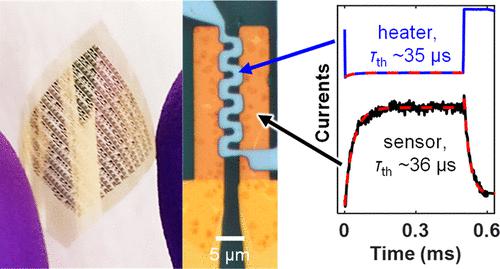当前位置:
X-MOL 学术
›
Nano Lett.
›
论文详情
Our official English website, www.x-mol.net, welcomes your
feedback! (Note: you will need to create a separate account there.)
Fast-Response Flexible Temperature Sensors with Atomically Thin Molybdenum Disulfide
Nano Letters ( IF 9.6 ) Pub Date : 2022-07-28 , DOI: 10.1021/acs.nanolett.2c01344 Alwin Daus 1 , Marc Jaikissoon 1 , Asir Intisar Khan 1 , Aravindh Kumar 1 , Ryan W Grady 1 , Krishna C Saraswat 1, 2 , Eric Pop 1, 2
Nano Letters ( IF 9.6 ) Pub Date : 2022-07-28 , DOI: 10.1021/acs.nanolett.2c01344 Alwin Daus 1 , Marc Jaikissoon 1 , Asir Intisar Khan 1 , Aravindh Kumar 1 , Ryan W Grady 1 , Krishna C Saraswat 1, 2 , Eric Pop 1, 2
Affiliation

|
Real-time thermal sensing on flexible substrates could enable a plethora of new applications. However, achieving fast, sub-millisecond response times even in a single sensor is difficult, due to the thermal mass of the sensor and encapsulation. Here, we fabricate flexible monolayer molybdenum disulfide (MoS2) temperature sensors and arrays, which can detect temperature changes within a few microseconds, over 100× faster than flexible thin-film metal sensors. Thermal simulations indicate the sensors’ response time is only limited by the MoS2 interfaces and encapsulation. The sensors also have high temperature coefficient of resistance, ∼1–2%/K and stable operation upon cycling and long-term measurement when they are encapsulated with alumina. These results, together with their biocompatibility, make these devices excellent candidates for biomedical sensor arrays and many other Internet of Things applications.
中文翻译:

采用原子级薄二硫化钼的快速响应柔性温度传感器
柔性基板上的实时热传感可以实现大量新应用。然而,由于传感器和封装的热质量,即使在单个传感器中也很难实现快速的亚毫秒响应时间。在这里,我们制造了柔性单层二硫化钼 (MoS 2 ) 温度传感器和阵列,它们可以在几微秒内检测温度变化,比柔性薄膜金属传感器快 100 倍以上。热模拟表明传感器的响应时间仅受 MoS 2的限制接口和封装。传感器还具有较高的电阻温度系数,约为 1-2%/K,并且当它们用氧化铝封装时,在循环和长期测量时运行稳定。这些结果,连同它们的生物相容性,使这些设备成为生物医学传感器阵列和许多其他物联网应用的优秀候选者。
更新日期:2022-07-28
中文翻译:

采用原子级薄二硫化钼的快速响应柔性温度传感器
柔性基板上的实时热传感可以实现大量新应用。然而,由于传感器和封装的热质量,即使在单个传感器中也很难实现快速的亚毫秒响应时间。在这里,我们制造了柔性单层二硫化钼 (MoS 2 ) 温度传感器和阵列,它们可以在几微秒内检测温度变化,比柔性薄膜金属传感器快 100 倍以上。热模拟表明传感器的响应时间仅受 MoS 2的限制接口和封装。传感器还具有较高的电阻温度系数,约为 1-2%/K,并且当它们用氧化铝封装时,在循环和长期测量时运行稳定。这些结果,连同它们的生物相容性,使这些设备成为生物医学传感器阵列和许多其他物联网应用的优秀候选者。











































 京公网安备 11010802027423号
京公网安备 11010802027423号